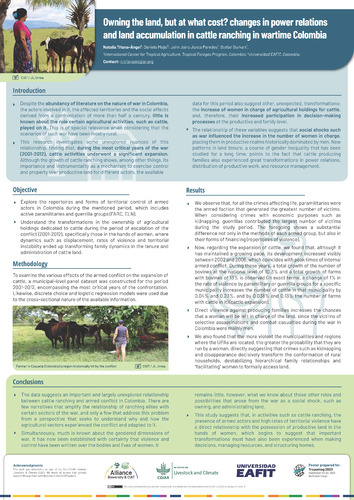Owning the land, but at what cost? Changes in power relations and land accumulation in cattle ranching in wartime Colombia
Given the length of the conflict and multiplicity of actors embedded in the Colombian war, it becomes necessary to understand the impact that violence, displacement and dispossession have amongst rural producers and in the agroeconomic sector in general. The struggle for land tenure, the management of natural resources, and the economic and social centrality of cattle ranching for various armed actors, are therefore vital aspects to consider in understanding the effects of the conflict in rural Colombia. Important contributions have been made, shedding light on the nature of war in Colombia and its negative societal effects, as well as a vast theoretical corpus has been established on the importance of livestock, not only for producing families, but also for rural elites and other active agents of armed confrontation. However, in addition to the already known effects, both of war (such as dispossession, displacement, loss of social order, poverty, etc.), and the role of livestock in it (as a means of financing confrontation, among others), the information available in Colombia suggests that other important and unexpected changes take place in land tenure, especially for women farmers. This research thus delves into the transformations in the ownership of the agricultural production units (UPA) dedicated to livestock production during the escalation of conflict in Colombia (2001-2012), to understand the relationship between war and societal dynamics of land tenure through a quantitative approach. Available data indicates that dynamics such as displacement, increasing violence rates and territorial instability contribute, at least to a certain extent, to transforming family dynamics and patterns in land tenure and administration. This is relevant not only for understanding the complexity of women's roles and functions within livestock farming, and for the analysis of their contingent agency in war contexts, but also contributes to a larger narrative on the unexpected outcomes of a longstanding war. Here we revisit the narratives about the role and participation of women in conflict and in livestock farming, while also exploring the circumstances in which gender roles, family relations and land ownership can shift.

